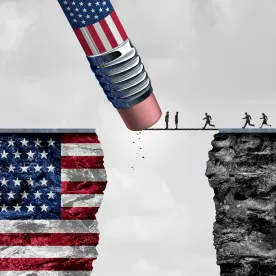On March 9, 2021 the Department of Homeland Security (DHS) announced that it will no longer enforce the Public Charge rule that originally took effect on February 24, 2020. Based on a number of recent U.S. Court of Appeals decisions which vacated the Public Charge rule, DHS immediately stopped applying the Public Charge Final Rule and the related “public benefits condition” to all pending immigrant and nonimmigrant applications and petitions that would have been subject to these rules.
Background
The Public Charge rule was implemented through a final rule which was published by DHS on August 14, 2019. The rule was subject to litigation, and following a Supreme Court Decision, it became effective in February 2020. Various lawsuits have followed and the rule has been enforced sporadically since that time. The Public Charge rule has faced intense criticism from immigrant rights advocates. For background on the brief history of the Public Charge rule, please see our prior alert.
USCIS is now applying the prior 1999 Interim Field Guidance which was in effect before the October 2019 Public Charge Final Rule was implemented. DHS subsequently published a new regulation on March 15, 2021 to reinstate the prior 1999 Public Charge guidance.
Who Is Impacted by the Change?
-
Applicants who file a Form I-485 Application to Adjust Status no longer need to include the Form I-944, Declaration of Self-Sufficiency, or any documentation required by that Form, with their I-485 applications.
-
Petitioners, beneficiaries and applicants for extension of stay and change of nonimmigrant status no longer need to provide information related to the receipt of public benefits on Form I-129 (Part 6), Form I-129CW (Part 6), Form I-539 (Part 5P and Form I-539A (Part 3), or provide any documentation required by those forms.
If an applicant or petitioner has already provided information solely related to the Public Charge Final Rule, and the application or petition is adjudicated on or after March 9, 2021, USCIS should not and will not consider any information that relates solely to the Public Charge Final Rule.
If a petitioner or applicant receives a Request for Evidence (RFE) or Notice of Intent to Deny (NOID) requesting information that is solely required by the Public Charge Rule, and the response is due on or after March 9, 2021, the petitioner or applicant does not need to provide that information. USCIS still instructs that the petitioner or applicant must respond to other aspects of the RFE or NOID that pertain to eligibility for the immigration benefit sought.
USCIS will issue further guidance regarding the use of affected forms. In the interim, USCIS will NOT reject any Form I-485 if the Form I-944 is included or excluded, and will not reject any Form I-129, Form I-129CW, Form I-539, or Form I-539A (Part 5), and Form I-539A (Part 3) that have been completed or left blank.




 />i
/>i

